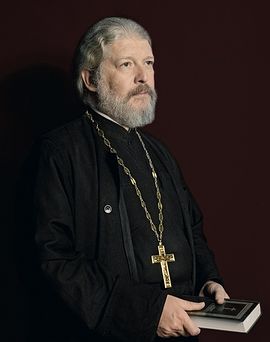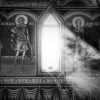Die every day, and you will live forever.
St. Antony the Great
 Being mindful of death is a virtue that ordinary people practice rarely, but it is something of which the Fathers speak a great deal in the Philokalia. It is one of man’s most productive capabilities. It only seems to us that contemplating death will drive us mad. In fact, people are afraid to think about death because overall, they are afraid to live. In our day, it has become customary to spend time, but not to live. People not only spend time, but even think that there is time to kill. On the one hand, it seems to us that we do not have enough time, and on the other, we think that there is too much, as it is boring.
Being mindful of death is a virtue that ordinary people practice rarely, but it is something of which the Fathers speak a great deal in the Philokalia. It is one of man’s most productive capabilities. It only seems to us that contemplating death will drive us mad. In fact, people are afraid to think about death because overall, they are afraid to live. In our day, it has become customary to spend time, but not to live. People not only spend time, but even think that there is time to kill. On the one hand, it seems to us that we do not have enough time, and on the other, we think that there is too much, as it is boring.
To live mindful of death is frightening because bearing it in mind means changing everything. One needs to treasure every moment, to spend every hour productively, filling it with profound significance. I remember that Metropolitan Antony of Sourozh, recollecting his mother’s death, said that the year she died was the happiest one in their relationship. When her grave illness would end was an unknown, and every day, as they met as if for the last time, it was important for them to show one another the full measure of their love. They knew that tomorrow, they might no longer have that chance.
When one lives mindful of death, his life changes completely. If today is the last day of your life, it is of course foolish to sin. It is foolish to waste time doing crossword puzzles or reading mysteries. It is foolish to curse or to argue. It is foolish to take offense at other people.
What is the point of taking offense if you are living your last day; it is better to forgive and to fill the time with kindness and love. If one does sin during that day, he will not tarry, but will immediately repent, will immediately come to ask forgiveness. And this is how he will be every day throughout his life, until his death. When one finds within himself the courage to live this way, his life becomes very productive, very happy, very fulfilling. He treasures every minute. Whether praying, or talking with others, writing poetry or painting pictures, inventing or building, he understands that perhaps this is his final opportunity to do something useful on this earth, to work for the good of his neighbor. Thus, for him, everything acquires a new significance. That is what being mindful of death is.
Being mindful of death can invigorate and fill our prayer rule. Sleep is a form of death, a departure from life, and our evening prayers are those of profound repentance and reconciliation. In one of the morning prayers, we read: “When the Judge of all will come with glory to render to each according to their deeds. May we not be found fallen and idle, but awake and alert for action, ready to accompany Him into the joy and divine palace of His glory, where there is the ceaseless sound of those keeping festival…”
This poetic and profound prayer, composed by St. Basil the Great, contains a very important thought — the thought of how man is to approach the Dread Judgment. St. Basil the Great refers to life as “night,” and says that the day and the coming of Christ is at hand. That prayer is an eschatological exclamation, the call of the Kingdom of Heaven. Just as the Divine Scriptures conclude with the words, “Even so, come, Lord Jesus (Revelation 22:20), and as we appeal in the Lord’s Prayer, “Thy Kingdom come…” – so the principal idea expressed in the prayer of St. Basil the Great concludes with those words, only expressed with a sense of profound theological awareness. In [that prayer] it is quite evident that each morning a Christian prepares to meet God and that each day may become the day on which he stands before the Judgment. We must understand that each and every time we begin a new day, we move toward God, and that in so doing we may well come to the Dread Judgment. We Christians await the day when the Judge will come and will render to each according to his deeds; thus let us go out, fully waking and vigilant, to meet our Savior.
Excerpted from Archpriest Alexei Uminsky’s book The Mystery of Reconciliation, Danilovsky Blagovestnik, Moscow, 2007
Source: Russian Orthodox Cathedral of St. John The Baptist, Washington, DC




















